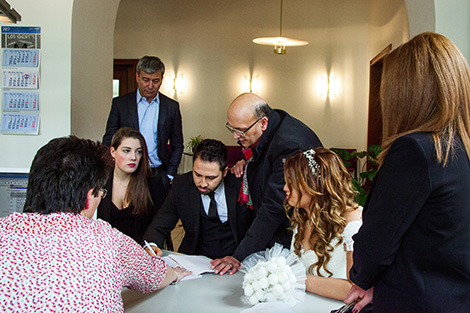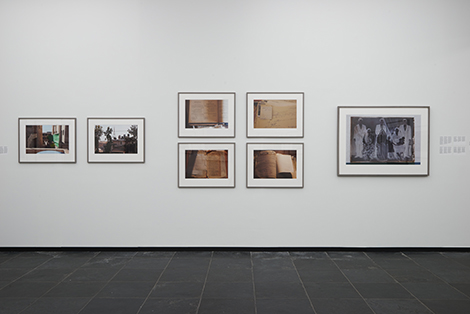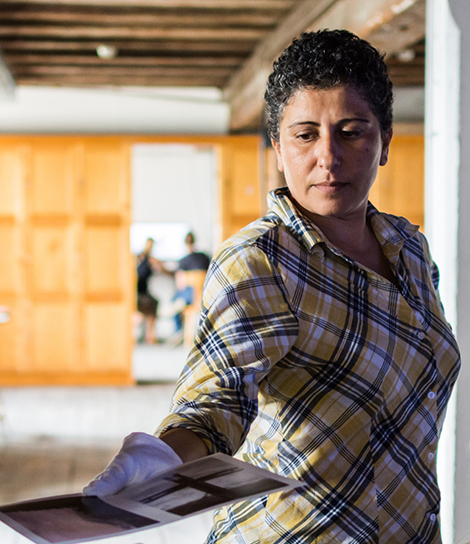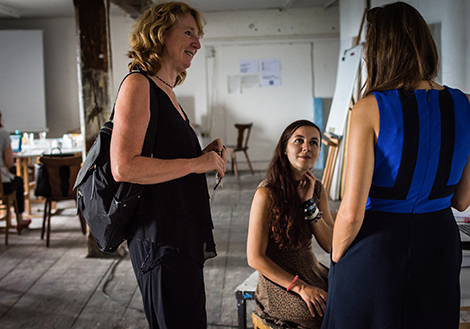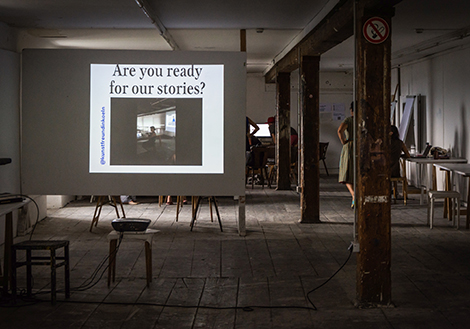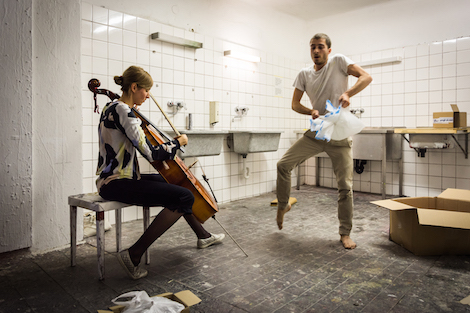A short interview with... Ahlam Shibli
Summeracademy: What does the term “Heimat/home” mean to you?
Ahlam Shibli: Santu Mofokeng has written: "The notion of 'home' is a fiction we create out of a need to belong."
Home's inaccessibility and evasiveness is responsible at one and the same time for the urgent need to represent what is denied representation and for the impossibility to consider representation a straightforward act of uncovering, revealing, and exposing "what has been". The photographic recording needs to be cautious not to objectify and victimise the subjects of state violence.
[Untitled (Heimat no. 27), Nordhessen, Germany, 2016–17, chromogenic print, 66,7 x 100 cm. Rathaus Kassel, 03.03.2017, courtesy of the artist, Copyright Ahlam Shibli]
S: You are a Palestinian photographer. Why did you choose photography as your medium?
A: To photograph has been always shaking my heart like nothing else. Photography has been for me and still is a field of imagination, of creation, of creating a truth, of reading what is there, and of building a narrative. For these reasons I find that photography is a way of opening the eyes and telling a truth.
S: What role does your heritage play in your photography?
A: My everyday life, my reading, my seeing, my listening, my observing, and my thinking are my heritage, and they are the source of my photography.
[Ahlam Shibli, Ramallah Archive, SMAK © SMAK, 2017]
S: How does your political point of view influence your work and how does your photography reflect it?
A: It challenges me more to open the eyes and see what is there and it offers me to listen deeply and to hear what I don't know. My political awareness helps me to raise interesting questions relating to the subjects/themes I'm dealing with. But themes and issues I photograph are also a consequence of my political, social and human awareness. The best examples of an answer to the question "how my photographs reflect it" are the artist's statements/wall texts that accompany most of my works as well as the captions that accompany the individual photographs.
A short interview with... Sabrina Steinek and Sabine B. Vogel
Summeracademy: Everyone can start a blog, what are important facts to consider?
Steinek/Vogel: If you are considering to start a blog make sure you have something to talk about. If you wanna blog on contemporary art it needs more then just nice images. Your writing has to be a full of knowledge, insider views and a critical focus.
S: What represents a good blog for you?
S/V: An exciting blog on art needs great images, a lot of news and extraordinary essays – just the press releases or a recommendation won’t be enough.
S: What do you teach in your course, which skills do the students learn?
S/V: In our course we are going to teach the technical basics to start a blog, some details on distribution skills and a first insight into writing on art.
A short interview with... Ekaterina Shapiro-Obermair!
Summeracademy: What is the Summer Academy for you?
Ekaterina Shapiro-Obermair: For me the Summer Academy is a unique place, where people with very different backgrounds and experiences meet to think about art, to work and to interact.
S: Is printing a contemporary medium for you?
E: Each medium could be used to express our present times, if you re-interpret it with a contemporary approach. I think it´s an interesting challenge to work with techniques today, which seem to be traditional or played through and to find new solutions to adapt the media.
S: What are the students in your class going to learn?
E: In my class we will work on individual artistic questions with means of graphic arts and reflect the abilities of the media. I hope to help everyone attending the class to become better in what he or she is doing and to give a lot of input and inspiration for the future.
[Ekaterina Shapiro-Obermair on Postwar Soviet Architecture at a conference in 2013]
A short interview with... Mark Van Yetter!
Summeracademy: Mark, what is painting for you? Why do you paint?
Mark: Painting is a way to respond to my time on earth, a way to filter existence. As to why I paint, this is a question I often ask myself, the reason becomes most clear to me when I evaluate all other options of what to do with my time. Once I reflect on this I relies many endeavors lead to a goal of emptiness. If painting follows a similar path I am one to think it is only so because our society has little tolerance towards it. I guess I mostly paint because I enjoy it.
[Mark Van Yetter, Damn Forest, 2016, oil on paper, 160x32cm, courtesy of the artist and Bridget Donahue Gallery]
S: What role plays the colour?
M: Colours are a big part of the world. It would only seem right to have them play a big part in a painting. So a big role.
S: What do you want to teach your students?
M: To think for themselves, to questions everything and not assume that what is considered orthodox is correct.
[Tex Rubinowitz, Mark Van Yetter and Sonja Bendel]
S: What do you like about the Summer Academy?
M: The people and the positive atmosphere. These things make it great.

[class of Mark Van Yetter 2017, photo: Mira Turba]
2018 Course Programme
The 2018 course programme of the Salzburg International Summer Academy of Fine Arts is now online.
Detailed descriptions of the courses and information on how to apply for courses and the various grants are available here.
18 different courses are on offer. We hope that you will (once again) find something of interest, and we look forward to receiving your application.
P.S. Good things take time to ripen – we are still working on our new responsive website, which will be published soon.

